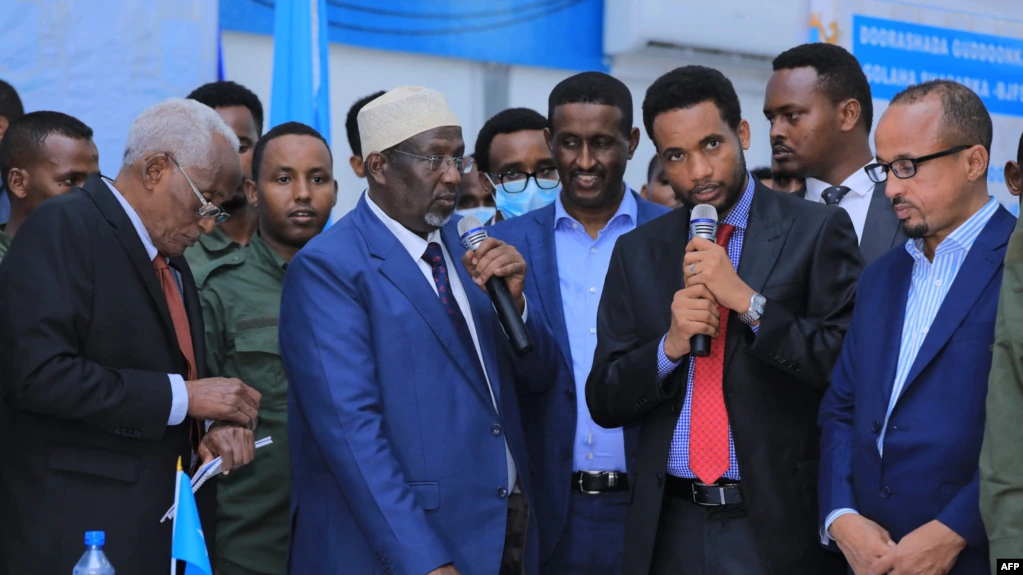
Somalia is expected to have a new president on May 15 – ten days after 34 members of the upper and lower houses of Parliament met in the capital Mogadishu to set the date for the process that has been delayed for almost two years.
The unorthodox method of choosing a president – through the so-called alternative democracy – may still not yield the desired result because of the unusually large number of candidates who include former presidents, according to observers. In addition, the imminent “election” will be a forced outcome result of threats by donor countries to halt funding to the Horn of Africa nation that has been in political turmoil since the ouster of dictator Mohammed Siad Barre in 1991.
Somalia was expected to elect a new president late 2020, but the timeline passed without the country having a new parliament in accordance with the transitional constitution. In Somalia, a president is elected by MPs courtesy of the right delegated by clans. The country has been unable to hold elections in line with the tenets of conventional democracy as a result of decades insecurity, clan feuds, religious extremism and violent crime.
During the meeting in Mogadishu on Thursday clan representatives – euphemistically referred to Members of Parliament to give a semblance of legitimacy to the political process as opposed to universal suffrage – elected lawmaker Abdiqani Ugas chairman of the Presidential Election Committee and Mohamed Kerow as his deputy.
Observers are, however, sceptical of the outcome of the May 15 “election”, as it comes against a backdrop of renewed terrorist-cum-extremist attacks on government installations by al Qaeda-allied al Shaabab and the burgeoning number of candidates who want to be at helm of the country with a population estimated to be 12 million people.
Last month, Parliament was attacked by al Shaabab in what been perceived as another attempt to defer presidential election and retain the current regime in power.
Majority of Somalis live in exile in neighbouring countries – Kenya, Ethiopia and Djibouti, while the rest are dispersed in Europe, Canada and the United States of America as refugees.
According to African Union reports, the 34 member committee settled on May 15 to elect incumbent Mohammed Abdullahi Farmaajo’s successor just two days to the deadline set by donors. The donors had warned that failure to meet the deadline would elicit indefinite suspension of funding unless a new government was formed.
Reached for comment, a former United Nations Development Programme senior officer, Dr Christoph Jaeger, expressed strong reservations about the expected outcome of the ‘selection’ saying the sheer number of candidates could undermine the process.
“I also am observing the Somali elections, which I would rather call selections. There is a relatively large number of presidential candidates but no clear indication who may have the best chances. Usually, the view is on the group of former presidents, but there are also a group of ‘new’ candidates. But I don’t have a crystal ball and would not pronounce my own preferences,” observes Dr Jaeger, now a senior advisor at Somalia Berghof Foundation Berlin – a non-governmental organisation.
In the past, the ambiguous international community has accused incumbent President Mohammed Abdullahi of undermining and delaying the ‘elections’ as a strategy to entrench his influence in Mogadishu, with the result being widespread resentment that has been linked to increased terror attacks in which a number of African Union peacekeepers have been killed and businesses in the capital Mogadishu shelled by the insurgents.
Technically, Farmaajo’s government could not discharge its mandate following a standoff with his Prime Minister Mohammed Hussein Roble.
Following the formation of the presidential election Committee deputy speaker of the upper house, Ali Shacban, expressed hope that composition of the committee would chaperone one of the last duties of parliament of electing the president.
In the past, Dr Jaeger has argued that the rest of the world should not abdicate its responsibility of giving Somalis a legitimate authority through universal suffrage. Jaeger’s position ties in with US Agency for International Development (USAID), which in a series of reports has urged a return to direct election of the government by the people, for the people.
The USAID report says universal suffrage “promotes greater political inclusion. It encourages greater civic participation; improves media coverage of political processes; strengthens the capacity of the National Independent Election Commission to administer credible, inclusive elections; and enables political parties to become more competitive, inclusive and representative.”
At present the Somalia constitution embraces – propped by support of international community – the so-called alternative democracy in which clans choose a representative who in turn is vested with the right to vote a president. Alternative democracy has been rabidly criticised as an anchor of corruption and promoter of hegemonism.
“But much of my knowledge is not even ‘second but rather third or fourth-hand’ information. In my view it’s rather a fallacy to hold ‘elections’ in a country where major pillars of a democratic state either do not exist or do not function. A ‘breakthrough’ was reached through international ‘threats’ – the refusal to put more money in the ‘elections’, and in my understanding, that spoilers would be refused entry to the USA.”
The presidential election has been delayed for more than a year because of political disputes that dragged out the process of electing members of parliament.
- A Tell report











